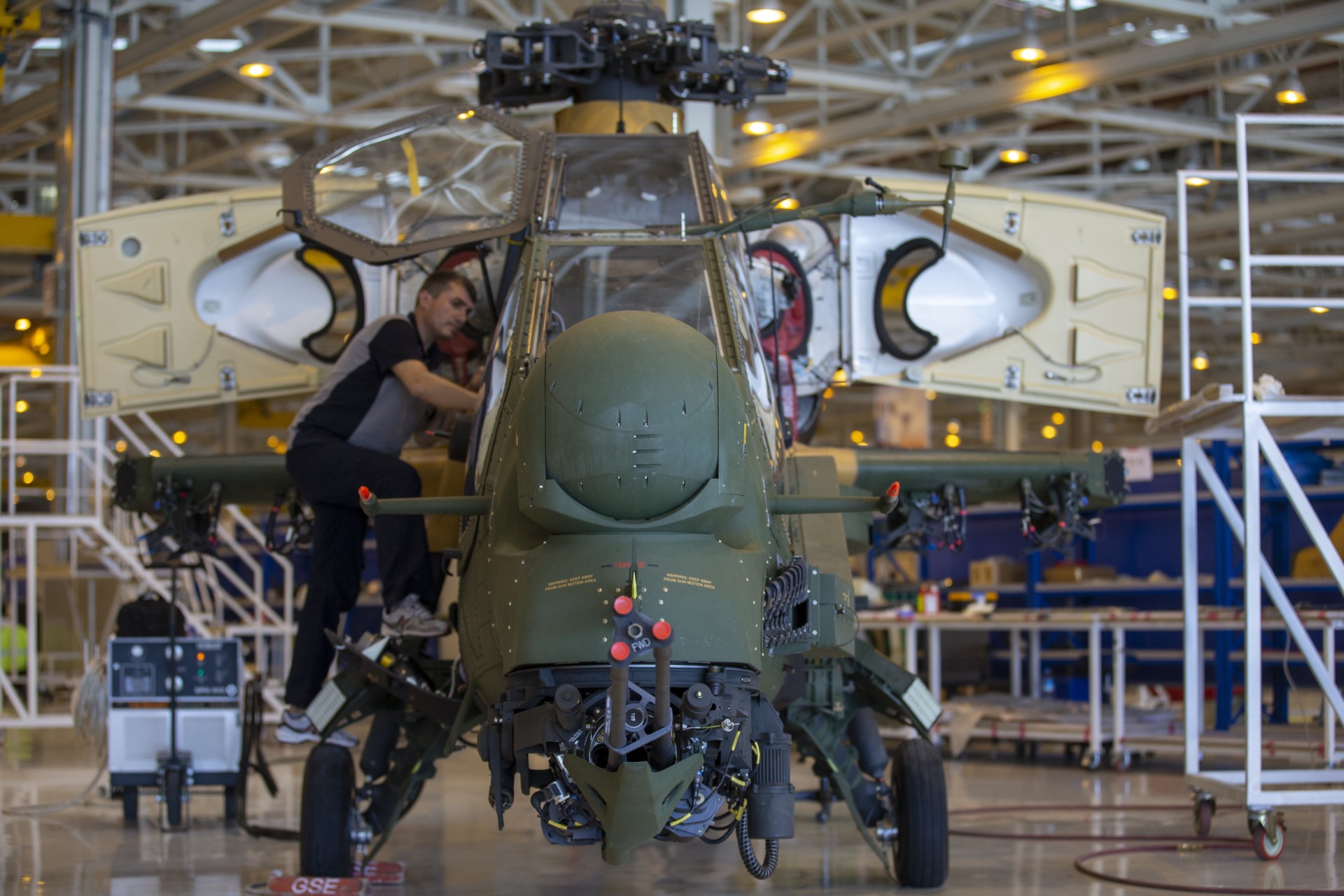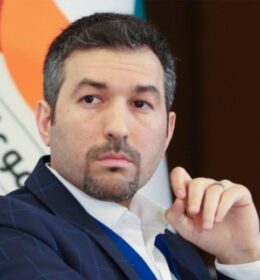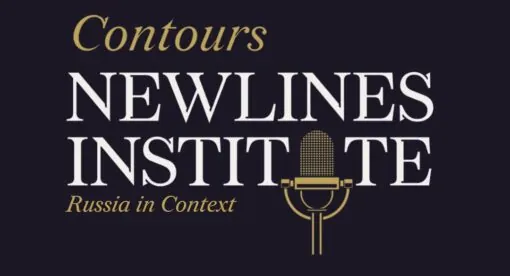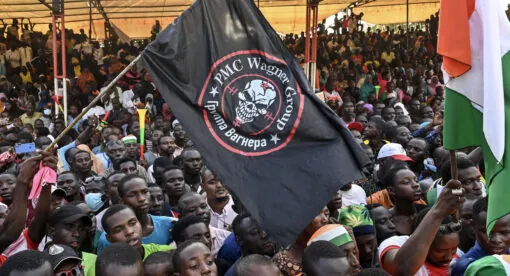As Turkey focuses on hard power, it is working to become less dependent on outside sources of weapons and materiel. Although Ankara is beefing up its military capabilities, it will not depend solely on hard power to achieve its goals.
Homegrown Defense Industry
Turkey’s military activism and assertive policies during the last few years would not have been possible without strong homegrown defense capabilities and resources. With the aim of becoming a major power, achieving defense autarky, and becoming more independent in its foreign policy, Turkey has been increasingly investing in developing its domestic defense industry. It has already made impressive progress in the last 15 years, moving from being the world’s third-biggest receiver of weapons to the 14th-biggest arms exporter. In 2018, the Stockholm International Peace Research Institute (SIPRI) described Turkey as an “emerging producer” with a goal of amplifying production capabilities in naval, air, land, electronics, and ammunition.

According to a SIPRI report released in March 2020, Turkey’s arms imports during the period between 2016 and 2020 decreased by 59% from the period between 2011 and 2015, with U.S. arms transfers dropping by 81%. This happened despite Ankara’s visible military activism and engagement in several regional conflicts and theaters.

As comprehensively examined in our July 2020 Terrain Analysis, the decline is a part of a policy that seeks to minimize weapons imports and maximize dependence on domestic systems. In the past 10 years, Ankara added more domestic defense systems and weapons to its inventory than ever before, decreasing its dependence on imports and increasing the percentage of local content in its defense procurement from 24% in 2002 to 70% in 2019.
The Turkish government has an ambitious program to produce strategic weapons and critical military equipment to meet the increasing needs of the Turkish armed forces locally, achieve strategic autonomy, and become more capable of assertively defending its national interests.
Increasing Drone Usage
The operational capacity of the Turkish armed forces has been making headlines in the last few years. One revolutionary aspect is the increasing potential of Turkish-made unmanned combat aerial vehicles (UCAVs). As political scientist Francis Fukuyama put it, “Drones have done much to promote Turkey’s rise as a regional power in the year 2020 … In the process, it has elevated itself to being a major regional power broker with more ability to shape outcomes than Russia, China, or the United States.”
Indeed, due to its drones’ highly capable performance and the country’s incorporation of a unique drone doctrine that prescribes the use of UCAVs as an air force in conventional battle, Turkey was able to achieve key military successes in complex geopolitical theaters in Libya, Syria, and Azerbaijan against Russian-backed forces. The significant impact of Turkey’s drones in these theaters and their contribution to enhancing the military performance of its allies have brought Ankara more influence. As a result, more clients are in line to buy Turkey’s drones, and more countries are willing to offer Ankara a foothold in the form of an alliance or a forward military base on their soil. The latest examples of these trends are Poland, an EU and NATO member that will receive its first batch of Turkey’s Bayraktar TB2 in 2022, and Azerbaijan, which recently entered into an alliance by signing the Shusha Declaration.

During a recent meeting devoted to evaluating the performance of the sector and 2021 projections, the head of the Turkish Presidency of Defense Industries, Ismail Demir, said several strategic naval, aerial, and land defense systems and platforms would be commissioned to the Turkish armed forces in 2021.
The TCG Anadolu, Turkey’s first and largest domestic, multi-purpose amphibious assault ship/light aircraft carrier, tops that list. The ship is expected to work as a floating naval base and can be configured to allow STOVL (short take-off and vertical-landing) jet fighters or even domestic UCAVs.
Other defense platforms the Turkish armed forces are set to receive this year include the ATMACA anti-ship missile, the AKYA torpedo, UAV systems including the Aksungur and AKINCI, and the HİSAR/A+ low-altitude air defense missile system. Progress also will continue on I-class frigates and Reis-class submarines, two of the most important projects for the Turkish navy. These systems have the potential to give an unprecedented boost to Turkey’s hard power.
Increasing Defense Expenditures
According to a 2020 SIPRI report, Turkey ranked 16th among the 40 countries with the highest military expenditure in 2019. The consecutive increases in the defense budget and military expenditures in the last few years correspond to the change in Turkey’s strategic regional landscape and the rise of a complex set of hybrid threats. It reflected Ankara’s military activism, expansion of the local defense industry, and intention to rely more on the country’s hard power, especially in light of its increasing unconventional military and security challenges.
Typically, the bulk of Turkey’s defense budget goes to personnel-related expenses, including salaries, allowances, and pension payments. For example, about 50% of the 2014 budget was allocated for personnel. In 2020, an estimated 36.9% of Turkey’s defense budget went to major equipment expenditures, including research and development.

NATO standards agreed on in 2006 require members to commit a minimum of 2% of their GDP to defense spending. This serves as one indicator of a country’s political will to contribute to the alliance’s common defense efforts. Despite mounting internal criticism of Ankara’s increasing defense expenditures, Turkey has met this guideline.

Turkey urgently needed to modernize its army and meet the rising threats. The increase in defense expenditures and the funds allocated to research and development paid off but also contributed to the current account deficit and came at the expense of other vital sectors. Yet, given that the government is still prioritizing defense spending despite mounting challenges including the COVID-19 pandemic and the contraction of the Turkish economy, the defense budget and related military expenditures are expected to increase steadily in the coming years.

The Limits of Turkey’s Hard Power
Turkey’s assertive defense strategy and military activism have achieved some of Ankara’s operational and strategic objectives in the last five years, but this came at the expense of its traditional soft power and increased the burden of its “precious loneliness” concept – an idea coined in 2015 by then-chief adviser to President Recep Tayyip Erdoğan, Ibrahim Kalin, to justify the high costs of siding with the Arab uprisings versus regional players. Moreover, some aspects of Turkey’s current strategy are unsustainable in the current climate. If it continues to depend solely on hard power, it will soon face a situation in which it is increasingly forced to choose between politics, economy, and security.
Defense-wise, reliance on forward military bases in volatile regions carries risks and is dependent on several factors including the state of bilateral relations with the host country and the regional and international environments. Additionally, economic opportunities that come with a forward-leaning defense posture do not always come to fruition.
In late 2020, the Turkish parliament extended or authorized several military missions outside the country. These missions, along with the ambitious goals of modernizing the domestic defense industry, mean that the government will need to allocate more financial resources and spend more on its military activism in unfavorable economic conditions. Sustaining these operations would increase the financial burden on the country. Without a strong and robust economy, it will be increasingly difficult to maintain the momentum, which could limit Turkey’s hard-power options in the future.
Furthermore, the homegrown defense industry is set to face a growing list of challenges, including the need for massive investment, political factors, dependence on foreign components, and the depreciation of the local currency. The last two factors have proven to be extremely problematic lately, as many key components on which the industry relies are sourced from abroad and priced in foreign currency. In this sense, increasing production in this sector means increasing imports and prices for local producers. Moreover, recent political feuds have made Western countries reluctant to share technology with Ankara.


The current charm offensive of the Turkish government, which includes de-escalation measures and rapprochement efforts toward some of its formal rivals such as Egypt and the UAE, responds to the changing dynamics in the international and regional environment and acknowledges the limits of its hard-power approach.
Turkey’s constraints do not mean it will quit depending on hard power; rather, its recent actions represent an attempt to bring balance back to its policies. One reason is that hard power is a means rather than an end. In order for Ankara to cash in the gains it achieved during the last few years through hard power, it needs to reach sustainable agreements, which can only be achieved through proactive foreign policy that favors dialogue and engagement. The regional power fatigue, the United States’ increasing detachment from the Middle East, and the recent recalibration of the position of the regional players all create an opportunity for Turkey to promote an interest-based agenda as a common ground for its relations with regional players that would favor this orientation rather than ideological confrontation.
Dr. Ali Bakir is a Research Assistant Professor in Ibn Khaldon Center for Humanities and Social Sciences at Qatar University. Dr. Bakir is also a senior consultant and an analyst who specializes in geopolitical and security trends in the Middle East with a particular focus on Turkey’s foreign and defense policies, Turkey-Arab relations, foreign policies of GCC countries and Iran, great power politics, small states’ behavior, and emerging unconventional risks and threats. Bakir has over a decade of experience as a consultant – working with senior officials, decision makers, and other stakeholders for governmental, non-governmental, and private sector institutions across the region.
The views expressed in this article are those of the authors and not an official policy or position of the Newlines Institute.





